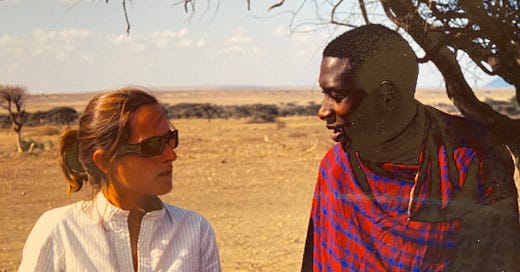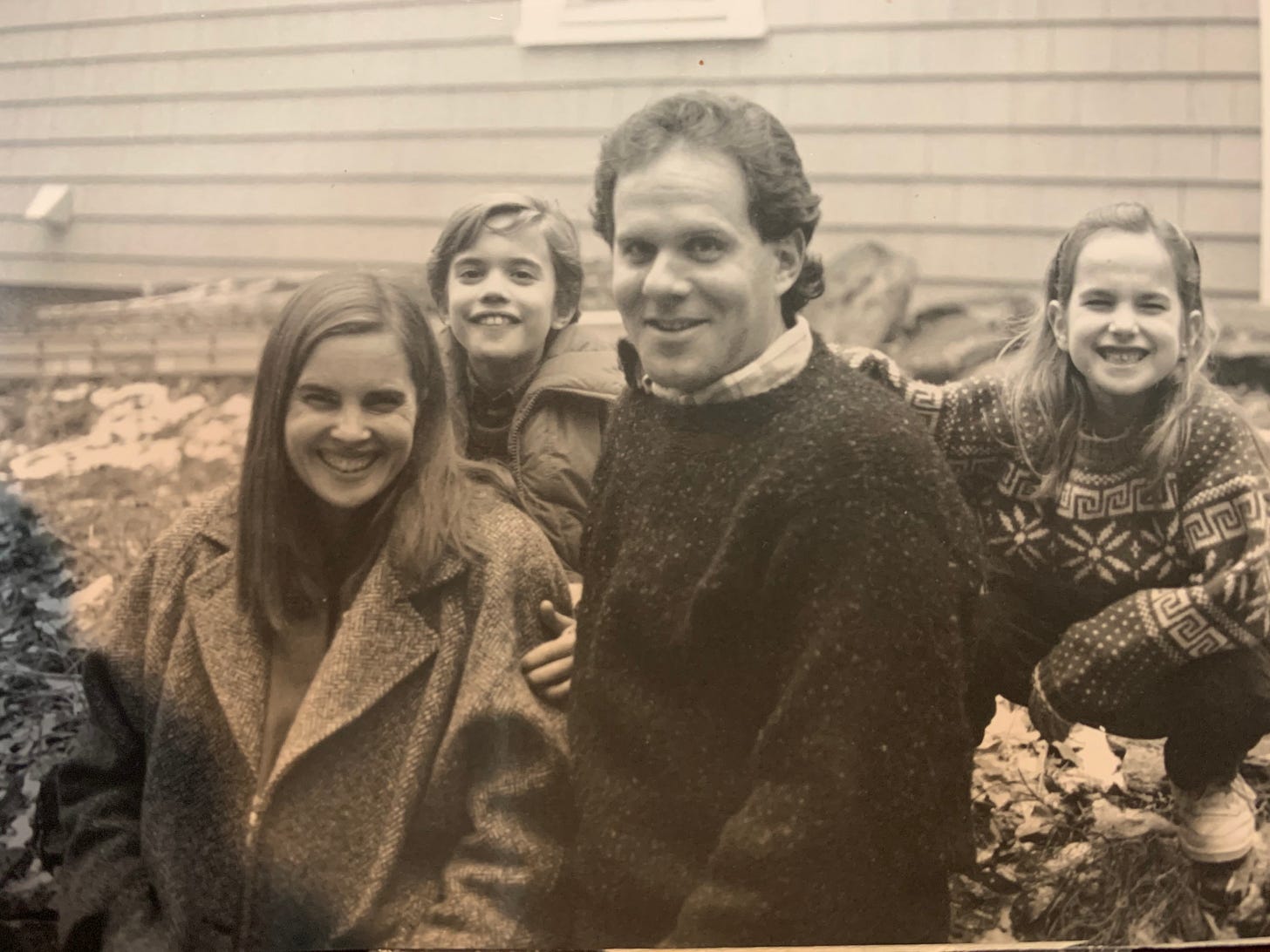In Conversation: Katharine Nanavatty
'I carry the memories of beloved colleagues and local friends, funny experiences, and a new filter to see America.'
“I remember there were mornings when I wanted to run to my desk (and I am not a runner!).”
That’s how Kate Nanavatty describes one of her most exhilarating assignments. And while she captures this career highlight so beautifully, she also nails the inevitable moments of anxiety, unease and occasional overwhelm. Perhaps that’s partly why, as she shares, she has “interspersed [her] career with some wonderful pauses for reflection.”
Any doubts or fears, which she witnesses with clarity, deepen the career and personal milestones.
Next year she’ll head to Amsterdam as Consul General and, I hope, will share even more stories from moments that make a life… and a “jackpot” career.
Please enjoy getting to know Kate.
When and how did you know you would be at home in the world?
I’m not sure I ever knew that I would be at home in the world. I’ve long had this sense that I was an outsider. I grew up in a town in upstate New York where my family was on the lower end of the socio-economic spectrum. I had financial aid to attend a private school in Bedford, N.Y, where we weren’t members of the social scene, let alone the country club that didn’t allow Jews or other minorities. But I always believed the world was overflowing with possibility, especially in America. I had big dreams and remember being excited about learning and the world.
The question does remind me of a moment in my late 20s during my first Foreign Service assignment in Tanzania. I was driving back from hiking Mt. Meru with my husband and childhood best friend. We were eating roti on the side of the road and joking around, probably about Point Beak.
Time stood still. While we were laughing and eating, I marveled at how comfortable we were in that small village; that our friendship could transcend age and location. In that moment, I felt I could be at home almost anywhere in the world.
Can you share how your early years and your upbringing impacted your dreams and desires?
Two aspects of my upbringing that impacted me were travel and being taken seriously without any whiff of parental pressure. My fondest family memories are trips I took with my parents and older brother. My parents were their happiest and most relaxed and my brother and I went “exploring.”

My parents and grandparents made me believe my views and ideas mattered but there was no pressure to go in one direction or another. My parents didn’t even pressure me to get good grades my mom would encourage me to skip school from time to time.
My grandfather and I shared a love of politics and foreign affairs. I’ll never forget him asking me when I was nine years old about the war in Bosnia and if I thought the United States should get involved.I didn’t have a good answer for him, but I remember really wanting one.
Do you remember the scent, smell, sounds or other visceral impressions from the first time you left the United States — either with State or before?
In my early 20s, I had the chance to travel to Thailand and India. Both of those countries overwhelmed me from the moment I landed. The diversity of people, pungent smells, spicy food, and chaos on the streets and along the rivers. I remember when I arrived in Delhi, it was Holi — the holiday celebrated by throwing colored paint. It was exhilarating and scary to arrive in a city that struck me as foreign on every level.
Can you tell me about which assignments lit you up, challenged you and surprised you?
I loved working on the Burma portfolio at the Department from 2010-2012. I joined a team of amazing diplomats in the East Asia Bureau, focused on seizing an opportunity to support the country’s democratic transition. The job was a jackpot in terms of pursuing my ultimate career interests – engaging in diplomatic negotiations as well as confidence building and conflict management efforts. I remember there were mornings when I wanted to run to my desk (and I am not a runner!).
In those two years, it was gratifying to see our diplomatic dialogues spur the release of political prisoners and the involvement of Aung San Suu Kyi in Burma’s political process. It’s been equally excruciating in more recent years to witness the democratic backsliding, coup and gross human rights violations there.
Serving as Chief of Staff to the Deputy Secretary of State was an assignment that challenged and surprised me every single day and shaped me more than any other professional experience.
The pressure was high. The pace was intense. We covered every national security and institution-wide management priority. I was surprised by how much I loved the job thanks to two incredible bosses, Ambassador John Sullivan and Stephen Biegun. I forged very special bonds with our small team. I grew and learned how critical each member of the team was for the Office to succeed.
Talk to me about your career trajectory and your personal method/preference for plotting your next steps. For example, do you plan or are you guided by intuition (or both/neither, etc.)?
I have interspersed my career with some wonderful pauses for reflection. After 10 years in the Foreign Service, I spent a year as adjunct faculty at Georgetown University’s Institute for the Study of Diplomacy through the Rusk Fellowship. The year was precious to invest in the next generation and engaging students who rekindled my own passion for public service.
After serving three years in the Deputy Secretary’s Office, I joined the Foreign Service Institute’s (FSI) Leadership and Management School to facilitate courses on national security and leadership. This has enabled me to reflect on my experiences, gain new perspectives from talented colleagues, and invest in personal growth for future assignments.
I am excited to apply what I am learning about leadership theory and practice in my next role asConsul General in Amsterdam in 2022.
Can you talk a bit about your support network and those people and/or groups in your life that bolster your confidence or remind you of your ambition and desires?
I am close with my fun and supportive parents. My boyfriend, now husband, is the person who insisted I take the Foreign Service oral assessment, even though at the time I didn’t think I wanted to join the State Department. Without his support, I wouldn’t be in the Foreign Service.
Our two sons keep me grounded, surrounded by joy and learning every day. My brother and sister in-law, along with dear friends including from the 8th grade) continue to boost my confidence and always, always make me laugh.
Was there a private struggle that you think, reflecting back upon now, might be a comfort or prove instructive for those just beginning their careers?
Where to start? Only kidding but I’ve had my dose of relatable struggles.
The two I’d share that might help others are:not being promoted when I really thought my work merited the promotion; and early years of motherhood and sleep deprivation.
On the first issue of being passed over for promotion, I was crestfallen after two years on the Burma desk and being passed over for promotion. But it was a humbling experience which gave me a healthy wake-up call and compassion for others going through the same disappointments. I’d say to those beginning their careers, take ownership of your career and that involves asking for help, seeking advice from mentors, and knowing your worth beyond whatever grade the systems assigns you.
On the second struggle, I felt right on the brink of giving up while being posted in Malaysia with two young ones — 2 years and 8 weeks old. My husband was traveling four days a week with a consulting company. In those months, I was exhausted, grumpy, and not sleeping.
As I contemplated packing up and heading home, a woman colleague and now friend took me under her wing. She told me this was the hardest part. She advised me to get no joke assistance on the care front. She helped me get over the common affliction of mom guilt. I am immensely grateful for her catching me with her wisdom.
I also had a male supervisor who was amazing. He told me unprompted that he supported new mothers and his management enabled me to have space and time to pump milk for my new baby.
Can you describe a moment when you felt fully "in the zone" in terms of your ideas or accomplishments? Can you explain that rush or exhilaration of knowing you were the exact person to handle a given situation or resolve a tough problem?
There was a six-month period as Chief of Staff in the Office of the Deputy Secretary when our 16-person team was in the zone. We had an off-site meeting to fine-tune a strategic plan and the entire team was locked in on driving forward five policy priorities. This included organizing multilateral engagements that were efficient, effective and innovative. Our team led the first multilateral meeting on the margins of the UN General Assembly to mobilize international awareness and coordination on the mass human rights violations against the Uighurs.
I also recall several times, usually at the end of a long week, in the role as Chief of Staff, where I had colleagues or staff reaching out one after the other with questions or requests for the boss’ time. By that time, I could see patterns and common problems and was able to ask the right questions, avoid repeat errors, and offer what felt like the right guidance to spur problem solving and collaboration.
What is a pressing foreign policy or national security issue that you think is too often misunderstood, overlooked or ignored?
There are experts in our government who will forget more about China than I’ll ever know. But from having worked in various assignments related to U.S.-China relations and U.S. strategic competition with China, some misunderstand the challenge.
To succeed is not competing with China on its own terms. While we have to contend with China’s influence globally, we have interests related to countries all over the world that are independent of China.
The United States is strongest when we are confident in our own democratic system and values. We need to focus on continuously improving our own democracy, enhancing our network of alliances and partnerships, and getting the values piece right at home and overseas.
It may seem strange within this context, but I like to end by asking about "the things you carry" from assignment to assignment (whether in D.C. or elsewhere/outside the country). The question comes from a book of the same name that is ostensibly about the Vietnam War but, of course, what the soldiers "carried" with them both before and after the war were very rarely "things" at all.
From my overseas assignments in Tanzania, South Africa, and Malaysia — I carry the memories of beloved colleagues and local friends, funny experiences, and a new filter to see America.
I joined the Foreign Service with a love of international relations and foreign cultures and although cliché, but the truth is my experiences abroad have given me new perspective on America, including the significant work we and future generations have to address racism, inequality and to promote and live up to our ideals.
Know a Woman in Foreign Policy Who Should Join our Conversation?
Share in the comments below or email me at jennifer.koons@protonmail.com.









